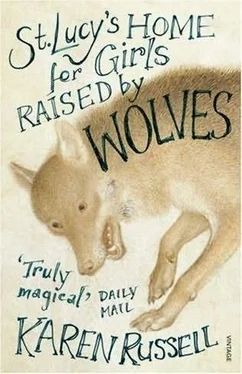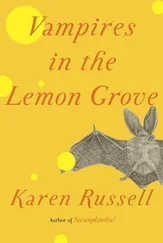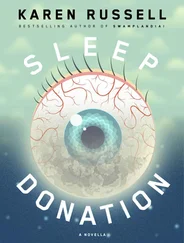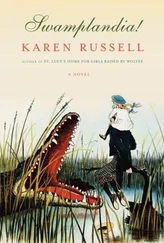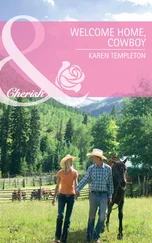“Ohhkaaythankyou,” I said. (It took me a long time to say anything; first I had to translate it in my head from the Wolf.) It wasn’t fair. They knew Mirabella couldn’t make bread balls yet. She couldn’t even undo the twist tie of the bag. She was sure to eat the birds; Mirabella didn’t even try to curb her desire to kill things — and then who would get blamed for the dark spots of duck blood on our Peter Pan collars? Who would get penalized with negative Skill Points? Exactly.
As soon as we were beyond the wooden gates, I snatched the bread away from Mirabella and ran off to the duck pond on my own. Mirabella gave chase, nipping at my heels. She thought it was a game. “Stop it,” I growled. I ran faster, but it was Stage 2 and I was still unsteady on my two feet. I fell sideways into a leaf pile, and then all I could see was my sister’s blurry form, bounding towards me. In a moment, she was on top of me, barking the old word for tug-of-war. When she tried to steal the bread out of my hands, I whirled around and snarled at her, pushing my ears back from my head. I bit her shoulder, once, twice, the only language she would respond to. I used my new motor skills. I threw dirt, I threw stones. “Get away!” I screamed, long after she had made a cringing retreat into the shadows of the purple saplings. “Get away, get away!”
Much later, they found Mirabella wading in the shallows of a distant river, trying to strangle a mallard with her rosary beads. I was at the lake; I’d been sitting there for hours. Hunched in the long cattails, my yellow eyes flashing, shoving ragged hunks of bread into my mouth.
I don’t know what they did to Mirabella. Me they separated from my sisters. They made me watch another slide show. This one showed images of former wolf-girls, the ones who had failed to be rehabilitated. Long-haired, sad-eyed women, limping after their former wolf packs in white tennis shoes and pleated culottes. A wolf-girl bank teller, her makeup smeared in oily rainbows, eating a raw steak on the deposit slips while her colleagues looked on in disgust. Our parents. The final slide was a bolded sentence in St. Lucy’s prim script: DO YOU WANT TO END UP SHUNNED BY BOTH SPECIES?
After that, I spent less time with Mirabella. One night she came to me, holding her hand out. She was covered with splinters, keening a high, whining noise through her nostrils. Of course I understood what she wanted; I wasn’t that far removed from our language (even though I was reading at a fifth-grade level, halfway into Jack London’s The Son of the Wolf ).
“Lick your own wounds,” I said, not unkindly. It was what the nuns had instructed us to say; wound licking was not something you did in polite company. Etiquette was so confounding in this country. Still, looking at Mirabella — her fists balled together like small, white porcupines, her brows knitted in animal confusion — I felt a throb of compassion. How can people live like they do? I wondered. Then I congratulated myself. This was a Stage 3 thought.
Stage 3: It is common that students who start living in a new and different culture come to a point where they reject the host culture and withdraw into themselves. During this period, they make generalizations about the host culture and wonder how the people can live like they do. Your students may feel that their own culture’s lifestyle and customs are far superior to those of the host country.
The nuns were worried about Mirabella, too. To correct a failing, you must first be aware of it as a failing. And there was Mirabella, shucking her plaid jumper in full view of the visiting cardinal. Mirabella, battling a raccoon under the dinner table while the rest of us took dainty bites of peas and borscht. Mirabella, doing belly flops into compost.
“You have to pull your weight around here,” we overheard Sister Josephine saying one night. We paused below the vestry window and peered inside.
“Does Mirabella try to earn Skill Points by shelling walnuts and polishing Saint-in-the-Box? No. Does Mirabella even know how to say the word walnut ? Has she learned how to say anything besides a sinful ‘HraaaHA!’ as she commits frottage against the organ pipes? No.”
There was a long silence.
“Something must be done,” Sister Ignatius said firmly. The other nuns nodded, a sea of thin, colorless lips and kettle-black brows. “Something must be done,” they intoned. That ominously passive construction; a something so awful that nobody wanted to assume responsibility for it.
I could have warned her. If we were back home, and Mirabella had come under attack by territorial beavers or snow-blind bears, I would have warned her. But the truth is that by Stage 3 I wanted her gone. Mirabella’s inability to adapt was taking a visible toll. Her teeth were ground down to nubbins; her hair was falling out. She hated the spongy, long-dead foods we were served, and it showed — her ribs were poking through her uniform. Her bright eyes had dulled to a sour whiskey color. But you couldn’t show Mirabella the slightest kindness anymore — she’d never leave you alone! You’d have to sit across from her at meals, shoving her away as she begged for your scraps. I slept fitfully during that period, unable to forget that Mirabella was living under my bed, gnawing on my loafers.
It was during Stage 3 that we met our first purebred girls. These were girls raised in captivity, volunteers from St. Lucy’s School for Girls. The apple-cheeked fourth-grade class came to tutor us in playing. They had long golden braids or short, severe bobs. They had frilly-duvet names like Felicity and Beulah; and pert, bunny noses; and terrified smiles. We grinned back at them with genuine ferocity. It made us nervous to meet new humans. There were so many things that we could do wrong! And the rules here were different depending on which humans we were with: dancing or no dancing, checkers playing or no checkers playing, pumping or no pumping.
The purebred girls played checkers with us.
“These girl-girls sure is dumb,” my sister Lavash panted to me between games. “I win it again! Five to none.”
She was right. The purebred girls were making mistakes on purpose, in order to give us an advantage. “King me,” I growled, out of turn. “I say king me!” and Felicity meekly complied. Beulah pretended not to mind when we got frustrated with the oblique, fussy movement from square to square and shredded the board to ribbons. I felt sorry for them. I wondered what it would be like to be bred in captivity, and always homesick for a dimly sensed forest, the trees you’ve never seen.
Jeanette was learning how to dance. On Holy Thursday, she mastered a rudimentary form of the Charleston. “Brava!” The nuns clapped. “Brava!”
Every Friday, the girls who had learned how to ride a bicycle celebrated by going on chaperoned trips into town. The purebred girls sold seven hundred rolls of gift-wrap paper and used the proceeds to buy us a yellow fleet of bicycles built for two. We’d ride the bicycles uphill, a sanctioned pumping, a grim-faced nun pedaling behind each one of us. “Congratulations!” the nuns would huff. “Being human is like riding this bicycle. Once you’ve learned how, you’ll never forget.” Mirabella would run after the bicycles, growling out our old names. HWRAA! GWARR! TRRRRRRR! We pedaled faster.
At this point, we’d had six weeks of lessons, and still nobody could do the Sausalito but Jeanette. The nuns decided we needed an inducement to dance. They announced that we would celebrate our successful rehabilitations with a Debutante Ball. There would be brothers, ferried over from the Home for Man-Boys Raised by Wolves. There would be a photographer from the Gazette Sophisticate. There would be a three-piece jazz band from West Toowoomba, and root beer in tiny plastic cups. The brothers! We’d almost forgotten about them. Our invisible tails went limp. I should have been excited; instead, I felt a low mad anger at the nuns. They knew we weren’t ready to dance with the brothers; we weren’t even ready to talk to them. Things had been so much simpler in the woods. That night I waited until my sisters were asleep. Then I slunk into the closet and practiced the Sausalito two-step in secret, a private mass of twitch and foam. Mouth shut — shoes on feet! Mouth shut — shoes on feet! Mouthshutmouthshut…
Читать дальше
